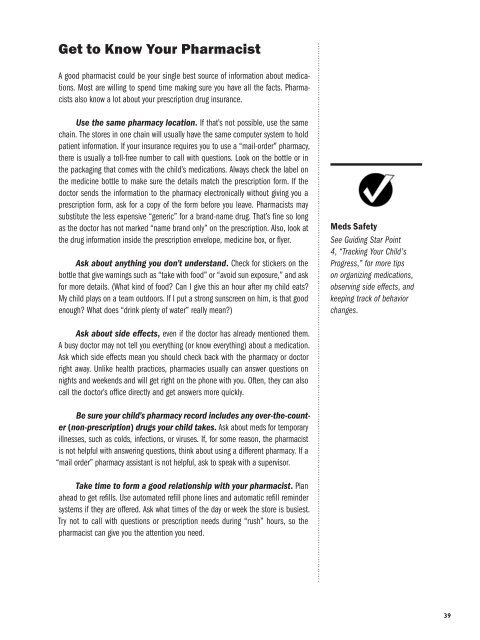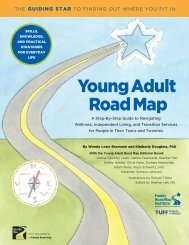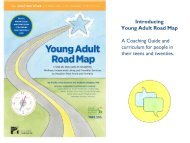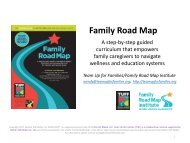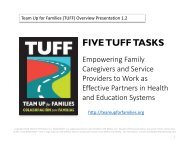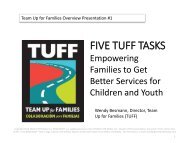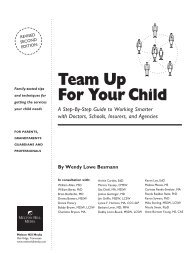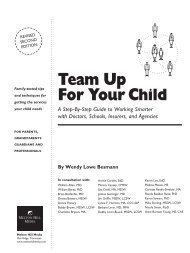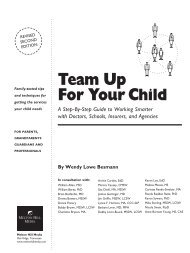Family Road Map Guide
Create successful ePaper yourself
Turn your PDF publications into a flip-book with our unique Google optimized e-Paper software.
Get to Know Your Pharmacist<br />
A good pharmacist could be your single best source of information about medications.<br />
Most are willing to spend time making sure you have all the facts. Pharmacists<br />
also know a lot about your prescription drug insurance.<br />
Use the same pharmacy location. If that’s not possible, use the same<br />
chain. The stores in one chain will usually have the same computer system to hold<br />
patient information. If your insurance requires you to use a “mail-order” pharmacy,<br />
there is usually a toll-free number to call with questions. Look on the bottle or in<br />
the packaging that comes with the child’s medications. Always check the label on<br />
the medicine bottle to make sure the details match the prescription form. If the<br />
doctor sends the information to the pharmacy electronically without giving you a<br />
prescription form, ask for a copy of the form before you leave. Pharmacists may<br />
substitute the less expensive “generic” for a brand-name drug. That’s fine so long<br />
as the doctor has not marked “name brand only” on the prescription. Also, look at<br />
the drug information inside the prescription envelope, medicine box, or flyer.<br />
Ask about anything you don’t understand. Check for stickers on the<br />
bottle that give warnings such as “take with food” or “avoid sun exposure,” and ask<br />
for more details. (What kind of food? Can I give this an hour after my child eats?<br />
My child plays on a team outdoors. If I put a strong sunscreen on him, is that good<br />
enough? What does “drink plenty of water” really mean?)<br />
Meds Safety<br />
See Guiding Star Point<br />
4, “Tracking Your Child’s<br />
Progress,” for more tips<br />
on organizing medications,<br />
observing side effects, and<br />
keeping track of behavior<br />
changes.<br />
Ask about side effects, even if the doctor has already mentioned them.<br />
A busy doctor may not tell you everything (or know everything) about a medication.<br />
Ask which side effects mean you should check back with the pharmacy or doctor<br />
right away. Unlike health practices, pharmacies usually can answer questions on<br />
nights and weekends and will get right on the phone with you. Often, they can also<br />
call the doctor’s office directly and get answers more quickly.<br />
Be sure your child’s pharmacy record includes any over-the-counter<br />
(non-prescription) drugs your child takes. Ask about meds for temporary<br />
illnesses, such as colds, infections, or viruses. If, for some reason, the pharmacist<br />
is not helpful with answering questions, think about using a different pharmacy. If a<br />
“mail order” pharmacy assistant is not helpful, ask to speak with a supervisor.<br />
Take time to form a good relationship with your pharmacist. Plan<br />
ahead to get refills. Use automated refill phone lines and automatic refill reminder<br />
systems if they are offered. Ask what times of the day or week the store is busiest.<br />
Try not to call with questions or prescription needs during “rush” hours, so the<br />
pharmacist can give you the attention you need.<br />
39


